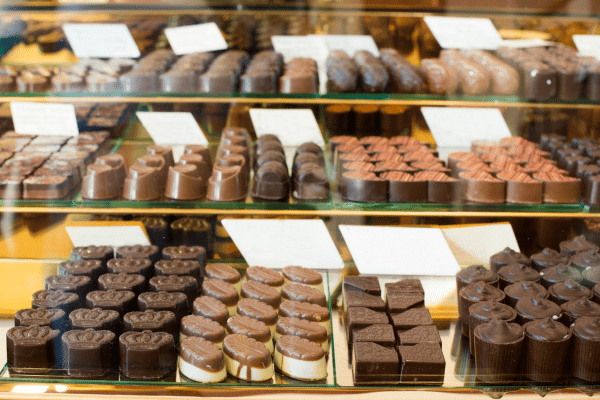België is beroemd om veel dingen, zoals bier, wafels, kant en natuurlijk chocolade. Maar hoe is dit kleine land een van 's werelds grootste producenten en exporteurs van deze heerlijke lekkernij geworden? In deze blogpost verkennen we de geschiedenis van Belgische chocolade, van de oorsprong in de 17e eeuw tot de moderne innovaties en kwaliteitsnormen.
We laten u ook kennismaken met enkele van de beste chocolademakers in Brussel, waar u een verscheidenheid aan smaken en stijlen kunt vinden die bij uw voorkeuren passen. Of u nu een inwoner of een expat bent, u zult zeker genieten van de rijke en diverse chocoladecultuur van deze stad. Bereid je dus voor om je zoetekauw te verwennen en meer te weten te komen over Belgische chocolade.

Chocolade arriveerde voor het eerst in België in de 17e eeuw, toen de regio onder Spaanse heerschappij stond. De Spaanse ontdekkingsreizigers hadden cacaobonen meegebracht uit Zuid- en Centraal-Amerika, waar ze de chocoladedrank hadden ontdekt die door de inheemse bevolking werd gemaakt. Deze drank werd beschouwd als een luxe en een delicatesse door de Europese adel, die ervan genoot met suiker en kruiden.
Een van de eerste keren dat er in België chocolade werd geserveerd, was in 1697, toen Henri Escher, burgemeester van Zürich, Brussel bezocht en op de Grote Markt een kop warme chocolade kreeg aangeboden. Hij was zo onder de indruk van de smaak dat hij het recept meenam naar Zwitserland, dat later een andere belangrijke chocoladeproducent zou worden.
Chocolade bleef een zeldzaam en duur goed tot de 19e eeuw, toen België Congo koloniseerde en toegang kreeg tot een grote voorraad cacaobonen. Koning Leopold II maakte van België de grootste handelaar in cacao en chocolade en moedigde de ontwikkeling van de industrie aan door belastingvrijstellingen en subsidies te verlenen aan chocolademakers.
Een van de invloedrijkste figuren in de Belgische chocoladegeschiedenis was Jean Neuhaus, een Zwitserse apotheker die in 1857 naar Brussel verhuisde en een winkel opende in de Koninklijke Sint-Hubertusgalerijen. Hij begon met de verkoop van medicinale chocolade omhuld met noten en vruchten, maar merkte al snel dat zijn klanten de chocolade zelf verkozen. In 1912 vond zijn kleinzoon Jean Neuhaus Jr. de praline uit, een holle chocoladeschelp gevuld met room, ganache of nougat. Hij creëerde ook de ballotin, een speciaal doosje om de pralines te beschermen en te presenteren.
Belgische chocolade staat bekend om zijn hoge kwaliteit en zuiverheid, die sinds 1894 bij wet geregeld zijn. De wet bepaalt dat minstens 35% cacao moet worden gebruikt bij de productie van chocolade en verbiedt het gebruik van plantaardige vetten of andere additieven die de smaak of textuur van de chocolade zouden kunnen veranderen. Dit zorgt ervoor dat Belgische chocolade een rijke smaak heeft en zacht aanvoelt.
Naast de wettelijke vereisten zijn er ook vrijwillige normen waaraan de meeste Belgische chocolademakers zich houden. In 2007 introduceerde de Europese Unie de "Belgische Chocolade Code", die bepaalt dat alle fasen van de chocoladeproductie in België moeten plaatsvinden, van het roosteren en malen van de cacaobonen tot het mengen en concheren van de chocolademassa.
Bovendien volgen Belgische chocolademakers traditionele methodes en recepten die al generaties lang worden doorgegeven. Ze gebruiken ook ingrediënten van hoge kwaliteit, zoals verse room, boter, noten, fruit en natuurlijke smaken. Ze besteden aandacht aan elk detail, van het selecteren van de beste cacaobonen tot het met de hand wikkelen van elke praline.
Belgische chocolade is niet alleen geworteld in traditie, maar staat ook open voor innovatie. Vandaag experimenteren Belgische chocolatiers voortdurend met nieuwe smaken, vormen, texturen en technieken om originele en verrassende producten te creëren die verschillende smaken en voorkeuren aanspreken.
Enkele voorbeelden van moderne trends in Belgische chocolade zijn:
Als u een expat bent die in Brussel woont of de stad voor een korte tijd bezoekt, vraagt u zich misschien af waar u de beste chocolade in de stad kunt vinden. België staat immers bekend om zijn heerlijke chocolade van hoge kwaliteit en Brussel is de thuisbasis van enkele van de meest gerenommeerde chocolatiers ter wereld. Om u te helpen uw zoetekauw te bevredigen, hebben we een lijst samengesteld van de beste chocolatiers in Brussel voor expats, gebaseerd op hun reputatie, variëteit, creativiteit en locatie. Hier zijn ze:
Belgische chocolade is een product van geschiedenis, cultuur en vakmanschap. Het heeft een lange en rijke traditie die teruggaat tot de 17e eeuw, toen chocolade voor het eerst in België werd geïntroduceerd door de Spanjaarden. Het heeft een hoge kwaliteit en zuiverheid die worden gegarandeerd door de wet en door vrijwillige normen. Het heeft een diversiteit en creativiteit die gedreven worden door innovatie en experimenten. Het is een lekkernij voor elke smaak en elke gelegenheid, van de klassieke praline tot de moderne bean-to-bar. Kortom, een zoet symbool van de Belgische identiteit en uitmuntendheid.